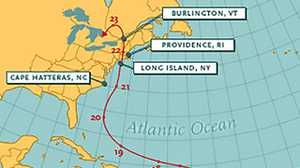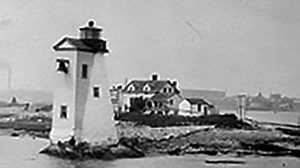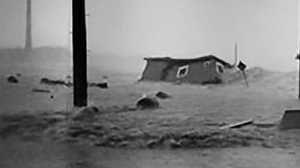Norman Caswell

On Conanicut Island in Rhode Island, Norman Caswell was driving eight students from the Thomas H. Clark Elementary School back to their homes in the afternoon of September 21, 1938. They were crossing a low causeway when a surge from the hurricane swept across the spit of land and washed the bus into the water. Joseph Matoes, Sr., the father of four of the children on the bus, saw the wave hit.
Joseph Matoes, Sr.: In the afternoon, I got to listening on the radio about a storm coming. So I started for the schoolhouse. For my kids. They had already left on the bus, so I started to come back and when I hit the beach, the water was about four feet high. At Mackerel Cove, the waves were getting worse and worse, the wind was getting stronger ...and the water was so high that my car and two others were swept into the water. I jumped overboard; my car was in a deep spot right near the cemetery, and I got ashore ...all soaking wet.
Joseph Matoes, Sr.: There was a woman and a boy in a car and she drove down the hill and they were washed overboard too, and both drowned.
They were later identified as William Ordner and his mother.
Joseph Matoes, Sr.: I saw Norman Caswell coming around the bend with the bus and I waved him back. I don't know whether he saw me or not. I saw the school bus go over -- with the kids. Caswell opened the doors, let the kids out. Well, I had two daughters on top of the roof of the bus, screaming their heads off. I saw them get swept off.
Joseph Matoes, Sr.: I saw something coming through the water, something moving and stretched out, so I took a chance and went down ...to the water. I got knocked down twice because the wind was so strong, but when I got there, it was Norman Caswell.
Joseph Matoes, Sr.: He was laying on his stomach. So I took my boot and kicked him, you know, in the ribs. He grunted. 'Well,' I said, 'he's still alive.' He says, 'Please let me die. I lost a whole bunch of the kids I had in the school bus. Everything's gone. Please don't move me. Let me die.'
Joseph Matoes, Sr.: I picked him up and threw him on my shoulder and I walked up the road where there was a wall to divide the roads. I said, 'You stay there until I get onto the other side and I'll take you into my house.' I put him down on the wall and he just turned over and rolled off and I had to pick him up again. Then I took him to my house. He said, 'Where's my bus?' I said, 'Down there in the pond.' I gave him some dry clothes and I changed myself; he stayed until nine o'clock. Then the tide went down and we went down and looked at the bus.
Caswell later recalled:
Norman Caswell: I saw that we would have to leave the bus or be drowned like rats. I told the children to grab each other tightly. I had hold of several when the huge wave came over us. I went down twice. When I came up, I saw Clayton Chellis swimming around. He was the only one who was saved besides me. Joe Matoes [Jr.] could have saved himself but he was drowned trying to rescue his younger sister.
Matoes remembered that while he and Caswell stood looking at the bus, Mr. and Mrs. Chellis showed up.
Joseph Matoes, Sr.: Caswell said to him, 'I got your boy, but your daughter's dead — gone' and Chellis got mad and he went down to the road and he took some rocks and he just crashed them windows out of that bus until he bust them all. He was really mad.
Not all the bodies were recovered. Matoes had four children on the bus.
Joseph Matoes, Sr.: We never did find one of my children. ... Four or five days later, Mrs. Chellis called to her husband and she said, 'Carl, what's that going down the bay there, half white and half red?' Well, she didn't know at the time; ...she thought it might be a lobster buoy.
Joseph Matoes, Sr.: But there was a kid who asked my wife, 'What kind of clothes was Dotty wearing?' and my wife told her, a white blouse and a red skirt. She went out to sea.
Clayton Chellis, the boy who survived, told his own version of the events to a neighbor, Edward Donahue.
Edward Donahue: The boy who survived said that when the bus driver let them out of the bus, he was holding his little sister's hand; she was only seven, and the last thing he remembered was that she told him, 'Clayton, don't let the water get in your eyes.'
The incident left Caswell a broken man. He died soon after the hurricane and neighbors said that he died from the shock of the deaths.







